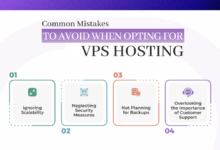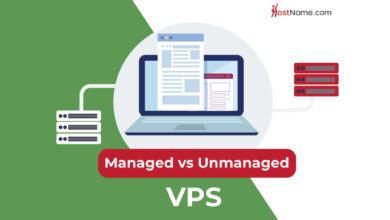5 Reasons Why VPS Hosting Is the Future of Web Hosting
5 Reasons Why VPS Hosting Is the Future of Web Hosting sets the stage for an exploration of the compelling advantages this technology offers. From enhanced performance and security to unmatched scalability and customization, VPS hosting is rapidly transforming the landscape of web hosting. This discussion will delve into the key reasons why VPS is becoming the preferred choice for businesses and individuals alike, navigating the complexities and highlighting the significant benefits.
This in-depth analysis will examine the superior performance and scalability offered by VPS, contrasting it with shared hosting limitations. We will explore the enhanced security and control VPS provides, emphasizing the mitigation of vulnerabilities present in shared environments. Furthermore, we’ll investigate the cost-effectiveness and flexibility of various VPS configurations, demonstrating how it offers optimal value for different needs. Finally, we will highlight the improved reliability, uptime, and ease of management, showcasing why VPS hosting is a future-proof solution for online presence.
Superior Performance and Scalability
VPS hosting offers a significant leap in performance and scalability compared to shared hosting, making it a compelling choice for businesses with growing online needs. The key difference lies in the allocation of server resources. Unlike shared hosting, where resources are divided among multiple websites, VPS hosting provides each website with its own dedicated resources, including RAM, CPU, and storage. This dedicated environment leads to improved performance and enhanced control.
VPS hosting allows for easy scaling to meet fluctuating website traffic demands. As your website grows, you can easily upgrade your VPS resources, such as adding more RAM or CPU power, without experiencing the downtime or performance degradation often associated with shared hosting upgrades. This flexibility is crucial for businesses experiencing unpredictable traffic spikes, ensuring consistent performance and a positive user experience.
Industries Benefiting from VPS Hosting Scalability
E-commerce businesses, for example, often experience significant traffic surges during sales events or holiday seasons. VPS hosting allows them to seamlessly handle these peaks without compromising website performance or risking lost sales. Similarly, SaaS companies, whose services rely on constant availability and responsiveness, find VPS hosting ideal for managing fluctuating user loads. Finally, media companies, particularly those streaming video or audio content, often require high bandwidth and processing power, which VPS hosting can readily provide and scale as needed.
Performance Metrics Comparison: VPS vs. Shared Hosting
| Metric | VPS Hosting | Shared Hosting |
|---|---|---|
| Loading Speed | Significantly faster due to dedicated resources. Typical loading times can be under 1 second. | Slower due to shared resources. Loading times can vary greatly depending on other websites sharing the server, often exceeding 3 seconds. |
| Uptime | Generally higher, often exceeding 99.9%, due to dedicated resources and better server management. | Can be lower, sometimes dipping below 99%, due to the impact of other websites on the shared server and potential server issues affecting all sites. |
| Resource Allocation | Guaranteed allocation of CPU, RAM, and storage. | Shared resources, leading to unpredictable performance depending on other websites’ activity. |
Enhanced Security and Control
VPS hosting offers a significant leap in security and control compared to shared hosting environments. The isolation provided by a virtual private server creates a more secure and manageable space for your website and applications, mitigating many of the vulnerabilities inherent in shared hosting. This enhanced security and granular control contribute significantly to the overall stability and reliability of your online presence.
The inherent security benefits of VPS hosting stem from its architecture. Unlike shared hosting, where multiple websites reside on the same server, a VPS provides each user with their own dedicated resources, including operating system, memory, and processing power. This isolation prevents other users’ actions from affecting your website’s performance or security. This fundamental difference reduces the risk of security breaches stemming from compromised accounts or malicious activities of other users on the same server.
Root Access and Control
VPS hosting typically grants users root access, meaning they have complete administrative control over their virtual server. This level of access allows for fine-grained customization and security configuration. Users can install security software, configure firewalls, manage user accounts, and implement other security measures tailored to their specific needs. This contrasts sharply with shared hosting, where users have limited control and rely on the hosting provider to manage server-level security. The ability to directly manage server settings allows for proactive security measures and rapid responses to potential threats.
Security Vulnerabilities in Shared Hosting and VPS Mitigation
Shared hosting environments are susceptible to several security vulnerabilities. A compromised account on a shared server can potentially expose the entire server to attack, impacting all websites hosted on it. Malware infections on one website can easily spread to others. Resource limitations imposed by the shared environment can also hinder the implementation of robust security measures. In contrast, VPS hosting mitigates these risks through its isolation. Each VPS operates independently, limiting the impact of a security breach on other users. The root access allows for the implementation of robust security protocols, minimizing the risk of compromise.
Common VPS Security Features
VPS hosting plans typically include a range of security features designed to protect your website and data. These features contribute to a more secure and reliable hosting environment.
- Dedicated Firewall: A firewall acts as a barrier, controlling incoming and outgoing network traffic. It can be customized to block malicious attempts to access your server.
- Regular Security Updates: VPS providers often provide automatic updates to the underlying operating system and software, patching known vulnerabilities and enhancing security.
- Data Backups: Regular backups of your website data are essential for recovery in case of a security breach or other unforeseen events. Many VPS providers offer backup solutions or integration with third-party backup services.
- Intrusion Detection/Prevention Systems (IDS/IPS): These systems monitor network traffic for suspicious activity, alerting administrators to potential threats and automatically blocking malicious attempts.
- SSL Certificates: SSL certificates encrypt the communication between your website and visitors, protecting sensitive data transmitted during online transactions or form submissions. While not exclusively a VPS feature, it’s easily implemented due to the enhanced control.
Cost-Effectiveness and Flexibility
VPS hosting presents a compelling value proposition, striking a balance between the affordability of shared hosting and the power of dedicated servers. It offers a flexible and scalable solution that adapts to evolving website needs, making it a cost-effective choice for a wide range of users.
VPS hosting sits comfortably in the middle ground between shared and dedicated server hosting. Shared hosting, while inexpensive, often lacks the resources and control necessary for high-traffic websites or resource-intensive applications. Dedicated servers, on the other hand, provide maximum control and resources but come with a significantly higher price tag. VPS hosting allows users to enjoy the benefits of dedicated resources without the substantial cost.
VPS Hosting Cost Comparison
The cost of VPS hosting varies significantly depending on the provider, resources allocated (RAM, CPU, storage), and the length of the contract. Generally, VPS plans are considerably cheaper than dedicated servers, offering a substantial cost saving for businesses and individuals who don’t require the full capacity of a dedicated machine. Conversely, VPS plans typically cost more than shared hosting packages, reflecting the increased resources and control offered. A basic shared hosting plan might cost $5-$15 per month, while a comparable VPS plan could range from $10-$50 per month, and a dedicated server could cost hundreds of dollars per month.
Scenarios Where VPS Hosting Offers Best Value
VPS hosting proves most valuable in several specific scenarios. For example, a small to medium-sized business experiencing moderate website traffic might find a VPS plan more cost-effective than a dedicated server, which would be significantly underutilized. Similarly, developers testing and deploying multiple applications benefit from the ability to allocate resources independently to each project. E-commerce businesses with fluctuating traffic patterns also appreciate the scalability of VPS hosting, allowing them to adjust resources as needed to handle peak demands without incurring the ongoing expense of a dedicated server’s full capacity.
VPS Configuration and Resource Allocation Flexibility
VPS hosting offers remarkable flexibility through various configuration options and resource allocation methods. Users can choose from different operating systems (e.g., Linux, Windows), control panel options (e.g., cPanel, Plesk), and resource allocations tailored to their specific needs. This allows for precise customization, ensuring users only pay for the resources they actually use, avoiding wasted expenditure on unused capacity. For instance, a user might opt for a plan with higher RAM and CPU if their application requires intensive processing power, while another user might prioritize larger storage space for data-heavy applications.
VPS Plan Comparison Table
| Plan Name | Price/Month | RAM | Storage |
|---|---|---|---|
| Basic | $15 | 1GB | 25GB SSD |
| Standard | $30 | 2GB | 50GB SSD |
| Advanced | $60 | 4GB | 100GB SSD |
| Premium | $100 | 8GB | 200GB SSD |
Customization and Customization Options
VPS hosting offers an unparalleled level of control and customization compared to shared hosting environments. This granular control allows users to tailor their server environment precisely to their specific needs, optimizing performance and functionality for their applications and projects. This flexibility extends to software installations, configurations, and resource allocation, empowering users to build a truly bespoke hosting solution.
The extent of customization available with VPS hosting is significantly greater than that offered by shared hosting. Users have root access, meaning they can manage every aspect of their server, from the operating system and kernel to individual applications and services. This contrasts sharply with shared hosting, where users have limited control over their environment.
Software Installation and Management
Users can easily install and manage a wide array of software on their VPS. This includes operating systems (like CentOS, Ubuntu, Debian), web servers (Apache, Nginx), databases (MySQL, PostgreSQL, MongoDB), programming languages (Python, PHP, Node.js), and countless other applications relevant to various projects. The ease of installation depends largely on the chosen control panel (e.g., cPanel, Plesk, or command-line interfaces). Many VPS providers offer one-click installers for popular applications, simplifying the process considerably. However, even without these tools, using package managers like apt (for Debian-based systems) or yum (for Red Hat-based systems) makes installation straightforward.
Benefits of Complete Server Control
Complete control over the server environment translates to numerous benefits. Users can optimize server resources for specific applications, ensuring optimal performance. They can implement security measures tailored to their unique needs, mitigating potential risks. Furthermore, they have the freedom to experiment with different configurations and software stacks to find the ideal setup for their projects, without being constrained by the limitations of a shared environment. This flexibility is invaluable for developers, businesses with specific software requirements, and anyone needing a highly customizable and secure hosting solution.
Installing an Application: A Step-by-Step Guide (Example: WordPress)
This guide demonstrates installing WordPress on a Ubuntu VPS using the command line. Remember to replace placeholders like `
- Update the system: This ensures you have the latest packages and security updates.
- Install Apache, MySQL, and PHP: These are essential components for running WordPress.
- Secure MySQL: This involves setting a strong root password and removing anonymous users.
- Create a MySQL database and user: WordPress will use this to store its data.
- Download WordPress: Download the latest WordPress version from the official website and extract it to the Apache document root.
- Configure WordPress: Access the WordPress installation through your web browser and follow the on-screen instructions to complete the setup. You’ll need the database credentials created earlier.
sudo apt update && sudo apt upgrade -y
sudo apt install apache2 mysql-server php libapache2-mod-php php-mysql -y
sudo mysql_secure_installation
mysql -u root -p
CREATE DATABASE wordpress;
CREATE USER ‘wordpressuser’@’localhost’ IDENTIFIED BY ‘‘;
GRANT ALL PRIVILEGES ON wordpress.* TO ‘wordpressuser’@’localhost’;
FLUSH PRIVILEGES;
EXIT;
wget https://wordpress.org/latest.tar.gz
tar -xzvf latest.tar.gz
sudo mv wordpress /var/www/html
Improved Reliability and Uptime
VPS hosting significantly enhances website reliability and uptime compared to shared hosting. This is due to the dedicated resources and isolated environment provided to each VPS, minimizing the impact of other users’ activities on your website’s performance and availability. The result is a more stable and consistently accessible online presence.
VPS hosting contributes to higher website uptime through resource isolation. Unlike shared hosting, where multiple websites share the same server resources, a VPS allocates dedicated resources (CPU, RAM, storage) to each virtual server. This means that even if another website on the same physical server experiences high traffic or technical issues, your website’s performance remains unaffected. This isolation significantly reduces the risk of downtime caused by resource contention or the malfunction of other websites.
VPS Uptime Guarantees Compared to Shared Hosting
Shared hosting providers typically offer uptime guarantees ranging from 99% to 99.9%, meaning your website could experience several hours of downtime annually. In contrast, VPS providers often offer higher uptime guarantees, frequently reaching 99.9% or even 99.99%, translating to significantly less downtime. This difference stems from the dedicated resources and greater control offered by VPS hosting. The higher uptime guarantee reflects the reduced risk of downtime associated with resource contention and the ability to proactively manage server resources.
Examples of VPS Hosting Preventing Downtime
A small e-commerce business relying on shared hosting experienced frequent downtime during peak shopping seasons due to resource limitations. Switching to VPS hosting eliminated these issues, allowing them to maintain a consistent online presence and avoid lost sales. Similarly, a blog with rapidly growing traffic faced frequent slowdowns and occasional outages on shared hosting. Migrating to a VPS provided the necessary resources to handle the increased traffic without performance degradation, ensuring consistent accessibility for readers.
Visual Representation of VPS and Shared Hosting Uptime
Imagine two bar graphs side-by-side. The first represents shared hosting uptime, showing a significantly shorter bar representing the guaranteed uptime percentage (e.g., 99%). The bar is punctuated by several smaller gaps, illustrating instances of downtime. The second bar graph, representing VPS hosting uptime, shows a much taller bar representing a higher guaranteed uptime percentage (e.g., 99.99%). The gaps in this bar are considerably smaller and fewer in number, visually demonstrating the superior reliability of VPS hosting. The difference in bar height and gap frequency clearly illustrates the improved reliability and uptime offered by VPS hosting.
Easier Management and Administration
Managing a Virtual Private Server (VPS) is significantly simpler than managing a dedicated server, offering a balance between the control of a dedicated server and the ease of use of shared hosting. This ease of management is largely due to the availability of user-friendly control panels and streamlined administrative interfaces. The ability to manage a VPS efficiently contributes to increased productivity and reduced operational costs.
VPS hosting platforms often integrate intuitive control panels like cPanel or Plesk, providing a graphical user interface (GUI) for managing various server aspects. These panels simplify tasks that would otherwise require command-line proficiency, making VPS administration accessible to users with varying levels of technical expertise.
VPS Management Using Control Panels
cPanel and Plesk are two widely used control panels that streamline VPS management. They offer a range of features, including file management, database administration, email account creation, and software installation. These panels significantly reduce the learning curve associated with server administration, allowing users to manage their VPS efficiently without needing extensive technical knowledge. For instance, creating a new email account in cPanel involves a few simple clicks, compared to the more complex command-line procedures required on a server without a control panel. Similarly, installing popular applications like WordPress becomes a straightforward process through one-click installers offered by these panels.
Basic Server Administration Tasks on a VPS
A step-by-step guide to performing basic server administration tasks on a VPS using a control panel like cPanel or Plesk could involve the following:
1. Accessing the Control Panel: Log in to your VPS control panel using the provided credentials.
2. File Management: Use the file manager to upload, download, and manage files on your server. This could involve uploading a website’s files or modifying configuration files.
3. Database Management: Create, modify, and manage databases using the provided database management tools (e.g., phpMyAdmin). This is crucial for managing website data.
4. Email Account Management: Create, modify, and delete email accounts, manage email settings, and configure mail forwarding.
5. Software Installation: Install and manage software applications using the control panel’s one-click installer or other provided tools. This is often used for installing content management systems (CMS) like WordPress.
6. Security Management: Configure security settings, such as firewall rules and SSL certificates, through the control panel’s security features. This is critical for protecting your server from unauthorized access.
VPS vs. Dedicated Server Management Complexity
Managing a dedicated server requires significantly more technical expertise than managing a VPS. While a VPS provides a virtualized environment with its own resources, a dedicated server grants complete root access and control over the entire machine. This necessitates a deeper understanding of server administration tasks, including operating system configuration, network management, and security hardening. On a dedicated server, you are responsible for all aspects of the server’s maintenance, including patching the operating system and managing security updates. A VPS, on the other hand, often has these updates managed by the hosting provider, reducing the administrative burden on the user.
Administrative Task Complexity Comparison
| Task | Shared Hosting | VPS | Dedicated Server |
|---|---|---|---|
| File Management | Simple (often limited) | Moderate (via control panel) | High (command-line or SSH) |
| Database Management | Simple (limited access) | Moderate (via control panel) | High (direct database access) |
| Software Installation | Limited (pre-installed apps) | Moderate (one-click installers or control panel) | High (manual installation and configuration) |
| Security Management | Low (managed by provider) | Moderate (control panel and some provider assistance) | High (full responsibility) |
Support and Resources
VPS hosting, while offering greater control and flexibility than shared hosting, also necessitates a robust support system to assist users in managing their server environments effectively. The availability and quality of this support can significantly impact the overall user experience and the success of their online ventures. Understanding the support options and resources available is crucial before choosing a VPS provider.
VPS hosting providers typically offer a wider array of support options compared to shared hosting. This difference stems from the increased complexity of managing a virtual private server. While shared hosting users generally rely on email support or a knowledge base, VPS users often have access to more comprehensive assistance.
Support Options Offered by VPS Hosting Providers
VPS providers commonly offer multiple support channels to cater to diverse user needs and preferences. These often include 24/7 email support, allowing users to submit detailed queries and receive timely responses. Many providers also offer phone support, providing immediate assistance for urgent issues. Increasingly popular is live chat support, enabling instant communication with support representatives for quick troubleshooting. Some advanced providers even offer dedicated account managers for enterprise-level clients, providing personalized support and proactive service. The specific support options offered vary among providers, with some focusing on self-service solutions through extensive documentation, while others prioritize direct human interaction.
Comparison of Support Levels Between VPS and Shared Hosting
The support provided for VPS hosting surpasses that of shared hosting in terms of both breadth and depth. Shared hosting typically offers limited support, often restricted to basic troubleshooting and account management. Email support is the most common method, with response times potentially varying widely. In contrast, VPS hosting providers often provide multiple support channels, including phone and live chat, ensuring faster response times and more effective problem resolution. The complexity of managing a VPS necessitates more in-depth support, which is reflected in the wider range of assistance offered. For instance, shared hosting support may not cover server configuration or software installation, while VPS support usually includes guidance on these aspects.
Resources Available to VPS Users
Beyond direct support channels, VPS providers offer a wealth of resources to aid users in managing their servers. Comprehensive documentation, including detailed guides, tutorials, and FAQs, is a standard feature. These resources cover various aspects of VPS management, from initial server setup and configuration to advanced troubleshooting and optimization techniques. Many providers also offer video tutorials and webinars, providing visual demonstrations of key tasks and concepts. Access to a community forum or knowledge base allows users to interact with other users, share experiences, and find solutions to common problems. These resources are invaluable for both novice and experienced users, empowering them to independently manage their servers and resolve issues efficiently.
Advantages of Robust Support and Resources for VPS Management
A robust support system and ample resources offer several significant advantages for VPS users:
- Reduced Downtime: Quick access to support minimizes the impact of server issues, reducing downtime and ensuring business continuity.
- Improved Efficiency: Comprehensive documentation and tutorials enable users to manage their servers more efficiently, freeing up time for other tasks.
- Enhanced Security: Support and resources can help users implement and maintain robust security measures, protecting their data and applications.
- Increased Productivity: By resolving issues quickly and effectively, support minimizes disruptions and allows users to focus on their core business activities.
- Greater Confidence: Access to reliable support and resources instills confidence in users, enabling them to confidently manage their VPS environments.
Ideal for Growing Businesses
VPS hosting provides a robust and scalable solution perfectly suited for the evolving needs of a growing business. Unlike shared hosting, which can become congested and slow as a website expands, VPS hosting offers dedicated resources that can be adjusted to match increasing demands, ensuring consistent performance and user experience. This adaptability is crucial for maintaining a competitive edge and fostering business growth.
VPS hosting allows businesses to seamlessly accommodate increases in website traffic and data storage needs. As a company expands its online presence, attracting more visitors and generating more data, a VPS can easily scale to handle the increased load without compromising speed or functionality. This scalability prevents the performance bottlenecks often experienced with shared hosting, allowing for uninterrupted growth and operational efficiency.
Website Traffic and Data Storage Management
The ability to manage increasing website traffic and data storage is a key advantage of VPS hosting for growing businesses. Imagine a rapidly expanding e-commerce platform experiencing a surge in online orders during a holiday season. A shared hosting environment might struggle to handle this sudden influx of traffic, leading to slow loading times and potentially lost sales. However, a VPS can be easily scaled up to accommodate the increased traffic, ensuring a smooth and efficient shopping experience for customers. Similarly, as the business grows, it will generate more data—customer information, product catalogs, transactional records—and a VPS can easily accommodate this increasing data storage needs, preventing performance issues. This scalability is crucial for businesses that anticipate significant growth, allowing them to focus on expanding their business rather than worrying about technical limitations.
Examples of Successful VPS Implementation
Several successful businesses leverage VPS hosting for its scalability and performance benefits. For instance, a rapidly growing SaaS (Software as a Service) company might initially start on a shared hosting plan, but as its user base expands, it would quickly outgrow its resources. Migrating to a VPS allows them to allocate more RAM, CPU, and storage, ensuring optimal performance for their users. Similarly, a small startup launching a new e-commerce website can start with a relatively inexpensive VPS plan and scale up as their sales and website traffic increase. This allows them to control their costs while maintaining a reliable and high-performing website. This controlled growth strategy, enabled by VPS hosting, is a significant factor in the success of many businesses.
Growth Trajectory Comparison: VPS vs. Shared Hosting
A website hosted on a shared hosting plan typically experiences a linear growth trajectory, eventually hitting a performance plateau as resources become constrained. This plateau is characterized by slow loading times, frequent downtime, and an inability to handle increased traffic. In contrast, a website hosted on a VPS exhibits an exponential growth trajectory. The scalability of the VPS allows the website to handle increasing traffic and data demands without encountering performance bottlenecks. This difference in growth trajectory is visually represented as a gradual, upward-sloping line for shared hosting that eventually flattens, whereas the VPS hosting growth trajectory is a steeply rising curve, demonstrating the ability to handle significantly greater growth.
Technological Advancement and Innovation
VPS technology is not static; it’s a constantly evolving field driven by the increasing demands of modern websites and applications. The need for faster processing speeds, enhanced security measures, and greater scalability has fueled significant advancements in VPS hosting, leading to more powerful and efficient solutions for businesses of all sizes.
The rapid pace of innovation in VPS hosting is directly linked to advancements in underlying hardware and software technologies. This includes improvements in server processing power, network infrastructure, virtualization techniques, and the development of more robust and feature-rich control panels. These advancements translate directly into improved performance, reliability, and security for users.
Advancements in Virtualization Technology
Modern VPS providers leverage advanced virtualization technologies like Kernel-based Virtual Machine (KVM) and Xen, offering improved resource allocation, enhanced performance, and greater isolation between virtual servers. These technologies allow for more efficient use of server resources, leading to better performance and cost-effectiveness for users. KVM, for example, is known for its performance and stability, while Xen offers a high level of flexibility and customization options. The continuous development and refinement of these technologies ensure VPS hosting remains at the forefront of web hosting solutions.
Improved Network Infrastructure and Connectivity
The underlying network infrastructure plays a critical role in the performance of VPS hosting. Modern VPS providers invest heavily in high-bandwidth networks, utilizing technologies like Software-Defined Networking (SDN) to optimize network traffic and reduce latency. This results in faster loading times for websites and applications hosted on VPS servers. The adoption of Content Delivery Networks (CDNs) further enhances performance by caching content closer to users, reducing server load and improving website accessibility globally. For instance, a company using a CDN might see a significant reduction in page load times for users located far from the primary server.
Enhanced Security Features and Tools
Security is paramount in web hosting, and VPS providers are continuously enhancing their security features to protect against evolving cyber threats. This includes implementing advanced firewalls, intrusion detection systems, and regular security audits. Many providers also offer features like DDoS protection and SSL certificate management, ensuring that VPS users have robust security measures in place to protect their websites and data. For example, the integration of advanced firewall rules and real-time threat monitoring can significantly reduce the risk of security breaches.
The Future Potential of VPS Hosting
The future of VPS hosting is intertwined with the emergence of new web technologies. The increasing adoption of serverless computing, edge computing, and artificial intelligence (AI) will likely influence the design and functionality of VPS solutions. We can expect to see more integrated AI-powered features for tasks such as website optimization, security management, and resource allocation. Furthermore, the increasing demand for low-latency applications will drive further advancements in network infrastructure and virtualization technologies, making VPS hosting an even more powerful and responsive platform for future web applications. The integration of these technologies will enable developers to build more scalable, efficient, and resilient web applications.
Concluding Remarks
In conclusion, the shift towards VPS hosting is not merely a trend, but a logical progression driven by the evolving demands of the digital world. The enhanced performance, security, cost-effectiveness, customization, and reliability offered by VPS hosting provide a compelling case for its adoption. As websites become increasingly complex and traffic demands fluctuate, the scalability and control afforded by VPS become indispensable. Embracing VPS hosting is not just about upgrading your infrastructure; it’s about securing a future-proof solution that empowers growth and ensures online success.









